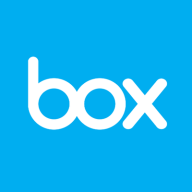

Box and Microsoft OneDrive for Business are prominent competitors in the cloud storage and collaboration space. Box seems to hold an advantage in collaboration flexibility and enterprise security, while Microsoft OneDrive for Business excels with seamless integration within the Microsoft ecosystem.
Features: Box excels in collaboration, security, and third-party integrations. It supports enhanced sharing capabilities and compliance with industry standards. Microsoft OneDrive for Business provides tight integration with the Microsoft ecosystem, allowing seamless collaboration through Office applications. Autosave, versioning, and familiarity for Microsoft users are notable features.
Room for Improvement: Box users seek better search functionality, faster performance, and enhanced integrations beyond Microsoft Office. Microsoft OneDrive for Business could benefit from more flexible permissions, streamlined syncing, and improved file sharing with external users, along with more intuitive interfaces.
Ease of Deployment and Customer Service: Box supports multiple deployment options, offering flexibility for different security needs. Its customer service is praised for dedicated support. Microsoft OneDrive for Business primarily offers public cloud deployment, ensuring seamless integration within the Microsoft ecosystem, with comprehensive support that sometimes benefits from premium packages.
Pricing and ROI: Box is regarded for competitive pricing, especially for enterprise deals, and offers significant ROI through reduced turnaround times though can be expensive for extensive API usage. Microsoft OneDrive for Business offers value as part of Microsoft 365, enhancing its appeal despite some licensing expenses. Each product provides value through efficiency and integration within their ecosystems.
For Microsoft OneDrive for Business, I would rate the support a nine.
I have not dealt with Microsoft support related to Microsoft OneDrive for Business, but I would rate their customer service in the range of seven or eight at least.
I am uncertain about its effectiveness at an enterprise level, where SharePoint might be preferred.
The solution is scalable.
Microsoft has provided the extended version of SharePoint alongside Microsoft OneDrive for Business.
It should be increased for the free version users, making it more reachable to many people.
Box was very stable and did not have any latency issues.
As a certified Microsoft product, it maintains high security standards.
On a scale from one to ten, it rates as a nine in stability.
I would rate the stability of Microsoft OneDrive for Business an eight out of ten as it has improved significantly since I started using it from the very initial days of Skydrive.
Collaborative editing was challenging if multiple people were in a document at once.
Microsoft OneDrive for Business currently lacks AI integration for management and collaboration, which is an area of interest for me.
I have experience with multiple version controls, including Git, TFS (Team Foundation Server), and GitHub.
Box had a very easy-to-use search feature and a good user interface on its website, which was faster and better than SharePoint.
Another benefit is that you can share information across multiple devices, not just on one device.
Sometimes when we work on PowerPoint or large Word documents, there is a chance that the document gets rolled back to a previous version, and you lose your work.
I appreciate the feature in SharePoint where it's difficult to permanently delete a file, as you can always recover files very easily.
| Product | Market Share (%) |
|---|---|
| Microsoft OneDrive for Business | 9.1% |
| Box | 8.1% |
| Other | 82.8% |


| Company Size | Count |
|---|---|
| Small Business | 16 |
| Midsize Enterprise | 9 |
| Large Enterprise | 27 |
| Company Size | Count |
|---|---|
| Small Business | 9 |
| Midsize Enterprise | 8 |
| Large Enterprise | 15 |
Box is a Modern Content Management Platform for companies of all sizes and industries. The difference that Box brings is that it offers the security and controls admins need with the sharing and collaboration capabilities end users want. Box has made it easier for people to securely share ideas, collaborate and get work done faster. Today, more than 62,000 businesses, including 59% of the Fortune 500, trust Box to manage content in the cloud.
The Box platform provides HIPAA, FINRA, FedRAMP, and many other compliances to go with granular access permissions and advanced security capabilities.
By using Box you can sync, share, and collaborate on all types of files, anywhere, on any device - but that's just the beginning. You can choose where to store your data, to manage your own encryption keys, and set workflows to automate content-based processes. You can also assign custom metadata tags to content, watermark sensitive content, and set file retention or legal hold policies.
Box has deep, native integrations with Microsoft Office and Outlook, Google Apps for Work, Salesforce, Netsuite, Docusign, Adobe, and many other best-of-breed solutions you may already be using.
Microsoft OneDrive for Business integrates with Microsoft applications, offering cloud editing, automatic saves, and extensive collaboration tools. It provides substantial storage, allowing users to sync folders, manage version history, and access files globally.
A cloud-based storage service, Microsoft OneDrive for Business enhances productivity through seamless Microsoft applications integration. It enables users to edit documents online, sync specific folders, and maintain extensive version histories. The platform supports file sharing and collaboration with substantial storage capabilities, ensuring data accessibility from anywhere. Its user-friendly interface allows for easy file organization and sharing while prioritizing security through advanced features. Though it excels in connectivity, bandwidth usage and file syncing issues sometimes occur, especially with large files. Room for improvement includes more intuitive interfaces, enhanced multimedia handling, and strengthened customer support during transitions.
What are the important features of Microsoft OneDrive for Business?Businesses across industries deploy Microsoft OneDrive for Business for secure file sharing and team collaboration. With the ability to store and access documents across devices, the platform supports efficient data management and backup solutions. Companies often integrate it with SharePoint for additional storage and project management flexibility.
We monitor all Content Collaboration Platforms reviews to prevent fraudulent reviews and keep review quality high. We do not post reviews by company employees or direct competitors. We validate each review for authenticity via cross-reference with LinkedIn, and personal follow-up with the reviewer when necessary.